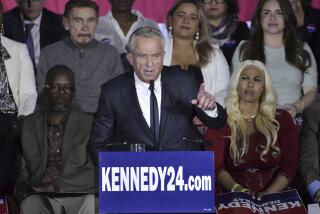Internment Remarks by Lawmaker Anger Peers
WASHINGTON — WASHINGTON -- Asian American members of Congress are denouncing a House Republican who said in a recent radio interview that the internment of Japanese Americans during World War II was appropriate.
The comments by Rep. Howard Coble (R-N.C.), chairman of a House subcommittee that oversees homeland security legislation, came in response to a caller’s suggestion that Arabs in the United States be imprisoned as an anti-terrorist measure.
Coble told the caller he did not agree, but that he believed President Franklin D. Roosevelt was justified in sending 120,000 people of Japanese descent to isolated camps in California and elsewhere -- in part, he said, for their own protection from potentially hostile citizens.
“We were at war,” Coble said on a North Carolina radio show this week. “They were an endangered species. For many of these Japanese Americans, it wasn’t safe for them to be on the street.”
The comments struck a nerve at a time when Republicans are trying to patch up the damage to the party’s image from remarks made by Sen. Trent Lott (R-Miss.) on Dec. 5 that were seen as racially insensitive. The comments, which seemed to endorse racial segregation, stirred so much controversy that Lott was forced to step down from the GOP leadership.
Rep. Michael M. Honda (D-San Jose), who spent his early childhood with his family in an internment camp, said Coble’s comments were especially offensive because they came just two weeks before the 61st anniversary of Roosevelt’s executive order authorizing the internment.
“The need for raising the awareness of this shameful chapter in U.S. history is more apparent than ever,” said Honda, who is sponsoring a resolution to recognize Feb. 19 as a “national day of remembrance” for those sent to the camps.
Rep. David Wu (D-Ore.), a Chinese American who is chairman of the Congressional Asian Pacific American Caucus, said, “At a time when we should be reflecting on a historic wrong, Congressman Coble has stood history on its head. Japanese Americans were not rounded up into internment camps for their own protection.
“If we do not accurately portray the past, we risk repeating it,” he said.
Rep. Robert T. Matsui (D-Sacramento) said he hoped the controversy “will serve to remind and educate” people about the lessons of history.
“In 1942, the U.S. government failed to display leadership in a time of war and crisis,” said Matsui, who with Wu and Honda wrote to Coble asking him to meet with them next week. “It’s critical that today’s leaders do not fall into the same trap.”
The National Asian Pacific American Legal Consortium has called on Coble to step down as chairman of the House Judiciary Subcommittee on Crime, Terrorism and Homeland Security.
“It is entirely inappropriate for someone who has these beliefs to be chairing such an important committee,” said Karen Narasaki, president of the consortium. She said Coble’s comments were as “offensive and ignorant “ as Lott’s implying a nostalgia for segregation.
Missy Branson, Coble’s spokeswoman, said he would not consider giving up his subcommittee chairmanship over the comments. “He has apologized if these remarks offended anyone,” she added.
Seeking to clarify the comments, Branson said Coble would not endorse the internment policy today, but he thought it was an appropriate decision at the time because American society was much less integrated and multicultural.
“We were much less tolerant and understanding of other cultures,” Branson said.
“The emotion that surrounded the bombing of Pearl Harbor was so intense, the possibility of harm coming to Japanese Americans was very strong as a result.”
Honda said his father told him as a child that it was absurd to believe internment was for their own protection.
“He said, ‘Mike, if it’s for your own protection, you have to wonder why you’re inside barbed wire with machine guns pointed at you,’ ” Honda said.
More to Read
Get the L.A. Times Politics newsletter
Deeply reported insights into legislation, politics and policy from Sacramento, Washington and beyond. In your inbox three times per week.
You may occasionally receive promotional content from the Los Angeles Times.











